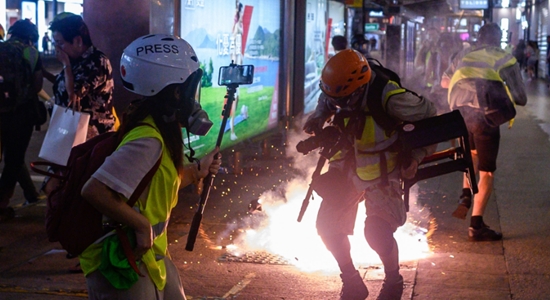
The Wall Street Journal has a stake in freedom of the press. Nevertheless, it recently fired one of its reporters in Hong Kong, Selina Cheng, for refusing to bow out of a campaign to head an organization that champions freedom of the press, the Hong Kong Journalists Association.
Cheng knew that she was risking her job by continuing to campaign and by accepting the post of chairman when she won. Then, when the Journal did fire her, it did not even honestly say why. (She was given a vague rationale about “restructuring.”)
We relayed the news in another recent post. But Cheng has now published her own account of what happened in Columbia Journalism Review (July 20, 2024).
The Hong Kong Journalists Association became an important defense against the erosion of an effective press—and a frequent target for the ire of the Chinese government….
Three weeks ago, my editor at the Wall Street Journal found out about my candidacy and immediately directed me to withdraw from the election. She said that the role would be incompatible with my job as a Journal reporter.
The Journal, she said, continues to report on incidents related to press freedom in the city, such as trials against the press, so having its employees advocating for press freedom publicly would create a conflict. The Journal, my supervisor said, did not want its reporters seen calling for greater freedoms—because, unlike in Western nations, it is not an established principle in Hong Kong.
Because I was the only candidate running for chair, my withdrawal would have meant that union operations were paralyzed. So when I won, I stayed on. For three weeks I existed in a kind of limbo. And then, on July 17, I was fired. The Journal told me it was restructuring. When two previous rounds of layoffs affected more than a dozen journalists and editors, I had been told my position was secure. But this round there was one layoff: me.
The Global Times, controlled by the Chinese state, said that the Journal’s decision was intended to distance it from our union, because we “wantonly defame[d]” the government.
It is no surprise that the Chinese Communist Party immediately made propagandistic use of the Journal’s decision.
The Journal thus demonstrates its willingness to appease the CCP and strengthen CCP rule at the expense of its own employee, a reporter on the ground, someone well aware of the risks of criticizing the regime that has taken over Hong Kong, someone who over the past several years has “witnessed the trials and sentencing of almost twenty journalists, citizen reporters, editors, and commentators.”
The Wall Street Journal needs and has benefited from the work that the Hong Kong Journalists Association does. Firing Cheng was willfully and woefully shortsighted.
What should the Journal do now? Rehire her (if she is willing to return), admit why it fired her, apologize. If doing this is thought to be way too risky for the Journal’s management to countenance, the paper should cease operating in Hong Kong altogether. This would be better than sticking around to continue to appease the totalitarians.





